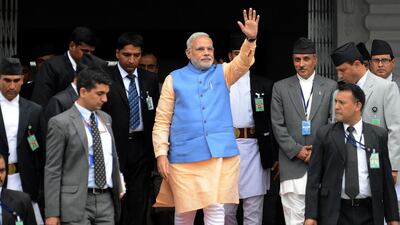NEW DELHI // Narendra Modi will embark upon his first official visit to the United States on Friday, the culmination of a dramatic reversal of political fortunes for India’s new prime minister.
Nine years ago, when Mr Modi was chief minister of Gujarat, the US denied him a diplomatic visa and revoked his existing business and tourist visas. The US government at the time cited its International Religion Freedom Act of 1998, which can block foreign officials accused of “violations of religious freedom” from entering the country.
The diplomatic snub was based partly on Mr Modi’s failure to contain the religious riots that had flared across Gujarat in 2002. Roughly 1,000 people — nearly 800 of them Muslims — died in the riots. At the time, the US could not have envisaged Mr Modi’s future political trajectory. A 2005 cable from the US embassy in India, released earlier this year by WikiLeaks, said: “Although this incident will chill our relations with the Gujarat Government … we do not expect serious or long-term national consequences.”
Subsequently, however, Mr Modi emerged as the most powerful leader within his Bharatiya Janata Party (BJP) and resoundingly won the national elections earlier this year.
Mr Modi has now not only regained his US diplomatic visa, but is also scheduled to meet president Barack Obama and address the United Nations General Assembly, the two highlights of a packed four-day visit.
The White House summit between Mr Modi and Mr Obama, scheduled for Tuesday, “will set the framework for bilateral cooperation between the two nation’s governments in defence, trade and infrastructure,” said Rajiv Biswas, a Singapore-based economist with IHS, an industrial research and advisory firm.
On Saturday, his first full day in the US, Mr Modi will visit the September 11 memorial in New York before proceeding to the UN to deliver his speech. On Saturday, Mr Modi is also scheduled to meet Michael Bloomberg, the former mayor of New York City, to discuss creating 100 “smart cities” in India. The “smart cities” vision, Mr Biswas said, “will require a high level of collaboration with foreign firms, both as investors and sources of technology.”
Mr Modi will deliver two speeches over the weekend: one in Central Park on Saturday, to an annual gathering called by the non-profit Global Citizens Initiative, and, on Sunday, at Madison Square Garden to an audience of nearly 20,000 Indians living in the US.
Although many of these audience members will have received their tickets for free, through various Indian community organisations in the US, some of them will have paid for the best seats. The highest priced tickets were sold for $50,000 (Dh183,650) apiece.
Mr Modi reaches Washington DC on Monday afternoon, in time for dinner with Mr Obama at the White House. The dinner itself will merely provide an occasion for private talks, given that Mr Modi is in the middle of a nine-day religious fast, drinking only lemonade and water.
The official summit between the two leaders, on Tuesday morning, will attempt to cover a range of issues, Mr Biswas said. This includes bilateral trade, the value of which stood at $120 billion last year. A new paper, written for the Indian think tank Gateway House by the former Obama administration adviser Nish Acharya, predicts that India-US trade could touch $1 trillion by 2030, though reaching that number will involve many challenges.
In an op-ed published in the Indian Express on Wednesday, Tarun Das, who formerly headed the Confederation of Indian Industry, a non-governmental body, pointed to a "trust deficit" between India and the US.
Although the two governments have often pledged to work together in fields such as nuclear energy, defence and trade, a combination of India’s outdated laws and protectionist policies, as well as narrow US interests, have impeded cooperation.
"Too often, we have been overly driven by domestic politics and overly focused on extracting concessions from one another," John McCain, a US senator and a member of the foreign relations committee, told Voice of America earlier this month. "Our strategic relationship has unfortunately devolved recently into a transactional one."
Mr Obama, Mr Das wrote, needed to shoulder the responsibility of bridging the deficit.
“His words, actions, body language will be under far greater scrutiny than those of Modi, who has shown magnanimity in immediately accepting the invitation to the US, in spite of recent history,” Mr Das wrote, referring to the visa revocation incident.
ssubramanian@thenational.ae

